Contents in this Page
Introduction
Research methodologies is a set of principles, process and system which evaluate the research credibility, authenticity, justification of the research methods, procedures and approaches (Saunders and Townsend, 2016). A research must go through the stages of research methodologies and the stages should go from outermost stage to innermost ones. To increase the credibility of a research findings, a researcher should show his methodological choices with justifications (Jamshed, 2014). This post is about how to write a research methodology. When the research onion is viewed from outside, it is clear that the stages go smoothly from broader view to core views offering different methodological choices to a researcher. The importance of the research onion lies in its adaptability to any research because the same research onion is applicable for scientific research, social science research or business research (Chilisa, 2019).
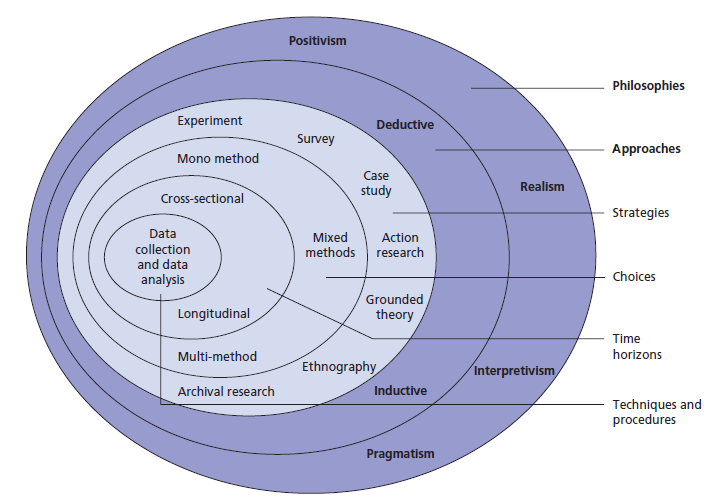
Above research Onion demonstrates six areas of research methodologies which are research philosophy, research approaches, research strategies, research methods, timeline, research techniques and procedures. Justification and validation of a research outcomes depends of the correct selection of research methodologies because methodologies should be selected based on the nature of research.
Research Philosophy
While writing a research methodology, you must include your justified research philosophical stance.
Research philosophy refers to the underlying knowledge, beliefs on which the research is based on (Saunders, Lewis and Thornhill, 2009). These authors have also stated that research philosophy entails the creation of knowledge and nature of that knowledge. Such creation of knowledge does not need to be a whole new knowledge; rather embarking upon answering the research questions also create a set of new knowledge. The research philosophies a researcher adopts contain significant assumption of how the researcher views the world and these assumptions are reflected in the selection of research methodologies and approaches (Quinlan et al., 2019). This suggests that the selection of a research philosophy should be justified and evaluated because it has certain reflections on the nature of knowledge and knowledge creation.
Business researchers must be aware of the philosophical commitment because the philosophies affect what researchers believe and think and how they conduct the business research. As per the research of Saunders, Lewis, & Thornhill (2009), research philosophies can be categorized as positivist research philosophy, realism research philosophy, and interpretive research philosophy.
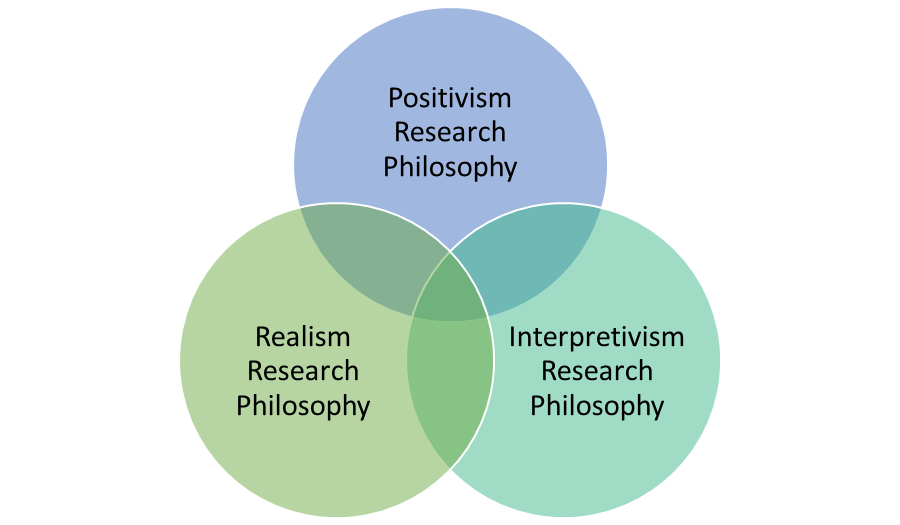
Positivism Research Philosophy
Positivist research philosophy takes the stance of a natural scientist, it means such philosophy assumes that the crated knowledge should be observable and can be measured (Bell, Bryman & Harley, 2018). Positivist research philosophy entails working with an observable social reality and that the end product of such research can be law-like generalisations similar to those produced by the physical and natural scientists. In simple words, positivist research philosophy deals with the research that results in creation of knowledge and facts that are backed-up by data and evidences. Another assertion of positivist research philosophy is that it has one or a few research hypothesis which are based on some sorts of theories; the hypothesis must be able to be justified and tested with the created knowledge (Hair Jr, Page & Brunsveld, 2019).
Advantages and disadvantages of a positivism research philosophy
There are a few advantages of adopting a positivist philosophy. The most important advantage is that it is adopted in a value-free manner which means the researcher cannot affect the research findings and even the data collection approach (Swift & Piff, 2014). The reason is that there is rarely any way to manipulate the data by personal implications. For example, a researcher cannot write the profit of the company was $100; whilst it is actually $200. Another advantage of this philosophy is that it generates measurable and quantifiable data which helps the researcher to effectively reach the research aims and objectives in a more efficient manner (Srivastava & Rego, 2011). However, the opponents of positivist philosophy argue that this philosophy does not result in rich insights into the research merely being positivist because rich insights cannot be obtained only with data (Dubicki, 2010).
Realism Research Philosophy
Realism research philosophy perceives that knowledge is created not from human being, rather knowledge is created from the real natural issues and factors that really exist on the nature (Chilisa, 2019). In the same fashion; Cohen, Manion & Morrison (2017) have asserted that materials and objects exist independent of human psychology. Saunders, Lewis, & Thornhill (2009) asserted that realism research philosophy is used in scientific research which can be proved through experiments. This asserts that a realism research philosophy is not suitable for a business research.
Interpretive Research Philosophy
An interpretive research philosophy takes the stance that the law-like generalisation theories (which was found in positivist philosophy) is not appropriate in business research. Interpretive research philosophies perceive that knowledge and ideas vary based on people’s perception in different society (Grove & Gray, 2018). This implies that one concept which is perceived true in one society and culture can be perceived as misleading in another society. Zikmund, Carr & Griffin (2013) advocated that it is of great importance for researchers to understand the perceptions of different individuals who have different value systems. Therefore, interpretive research philosophy is more engaged with people and their perceptions in contrast to data and science.
Advantages and disadvantages of Interpretive Research Philosophy
Advantage of interpretive research philosophy is that it leads to in-depth discussion of the study because the researcher gets the opportunity to go in-depth with human participation (Grove & Gray, 2018). However, drawback of this philosophy is that the research outcomes cannot be measured in numerical means; additionally, it sometimes becomes difficult to reach a research outcome with this philosophy.
Research Approach
Research approach refers to the styles of conducting a research which can further be categorized as deductive research approach and inductive research approaches (Law, 2010). In the same fashion, Saunders & Lewis (2012) have asserted that the business researchers should have clear ideas about the extent to which they are confident about their research theories which is the main concern of research approach.
Inductive Research Approach
Inductive research approach implies that research hypothesis are not set at the beginning of a research (Sekaran & Bougie, 2016). Therefore, research is conducted in-depth using available data to find a theory. Sekaran & Bougie (2016) have argued that inductive research approach is adopted when the relationship between the variables and problems are not known. In this research, the extent and nature of relationship between research problems and variables are known because it has been found in the literature review that innovation agility has close association with firm performance.
Selection of the research approach in a certain study depends on the relation between the research problems and research variables. If nature of relationship between the research problem and research variables are not certain and unknown, inductive research approach should be selected.
Deductive Research Approach
Deductive research approach is commonly used in scientific or data-driven research. The main assertion of deductive research approach is testing the theory (Anderson, 2015). It assumes that the research theory and hypothesis is already established before conducting the research, the intension is to test the research theory and hypothesis (Erickson, 2012). This research has used a deductive research approach for a range of reasons. The most important reason of adopting the deduction is that this approach implies that research variables have casual relationships (Fisher & Buglear, 2010).
Selection of the research approach in a certain study depends on the relation between the research problems and research variables. If there is a casual relation between the research problem and research variables, deductive research approach should be selected.
Research Purpose
It actually means the reasons of conducting a research that answers the research questions in certain ways (Clarke & Hoggett, 2019). There are mainly two types of research purposes: exploratory studies; and explanatory studies.
Exploratory Research Purpose
Exploratory study is an excellent method to find out what is happening or to find a new insights (Flick, 2015). There are a range of advantages to have an exploratory research purpose.
Firstly, exploratory studies offer an excellent opportunity to the researcher to have critical insights on the research aspect.
Secondly, exploratory research purpose offers excellent flexibility (Clarke & Hoggett, 2019). However, an important limitation of exploratory study is that such exploration might result in perception that the research is unnecessary because there is no issue to research on the subject (Clarke & Hoggett, 2019).
Exploratory studies are usually adopted in three cases as demonstrated below, as per Saunders, Lewis & Thornhill (2009).
- Search of literature on certain aspect
- Interview expects on a subject
- Conduct focus group interviews
Selection of the research purpose depends on the nature and aspect of the study.
Explanatory Research Purpose
Explanatory study is about establishing causal relationship between research problems and variables (Grove & Gray, 2018). An advantage to explanatory research purpose is that it yields excellent control of the research to the researcher.
Research Strategy
The most suitable research strategy should be selected to be able to answer the research objectives and research questions in the best possible manner. According to Saunders, Lewis & Thornhill (2009) there are different types of research strategies:
- Experiment
- Survey
- Case study
- Action research etc.
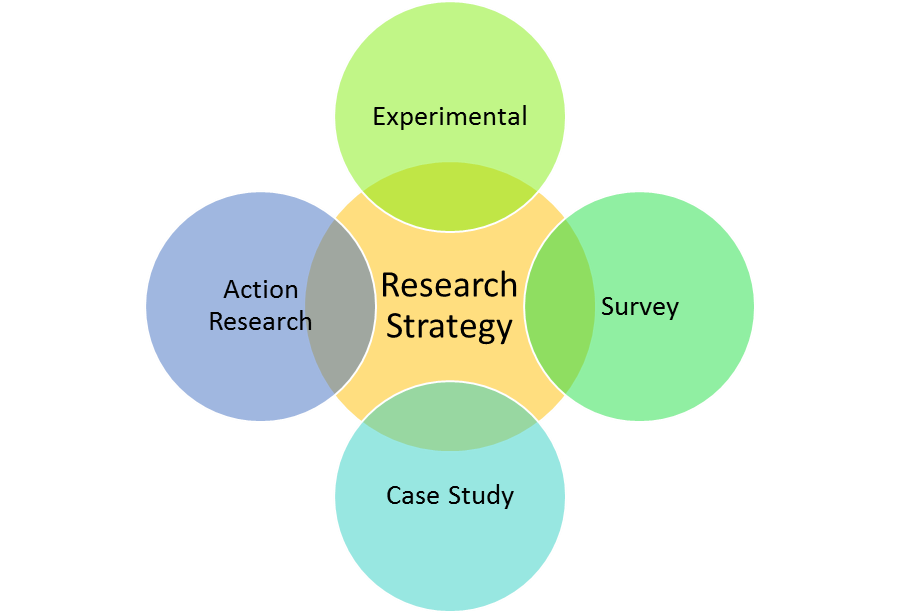
Experiment is a form of research that takes the stance of a natural scientist (Saunders, Lewis & Thornhill, 2009). Such researches take place in the laboratories. Experiment research strategies are adopted in the case of scientific research. However, a business research usually does not adopts experimental research strategy.
Another research strategy, survey, is associated with deductive approach and quantitative method (Kumar, 2019). The most important advantage of this strategy is that it allows the researcher to collect large volume of data from many respondents with the means of survey questionnaire. However, survey strategy is a suitable research strategy for a qualitative research.
Case study is another research strategy which involves empirical investigation of contemporary issues related to real-life scenario (Ledford and Gast, 2018). Case study is completely a different strategy from experimental study in that experimental studies are completely based on scientific regulations. Case study is also different from survey strategy in that survey strategy is limited to the extent to which it is supported by the collected date (Ledford and Gast, 2018). On the other hand, case study provides excellent insights and in-depth understanding of the scenario- facilitating the way to generate rich understanding of the research aspect.
Research Methods
Research Methods or methodological choices refer to the nature of generated knowledge: qualitative, and quantitative knowledge etc. (Symon & Cassell, 2012). Data collection techniques are closely associated with the choice of methods.
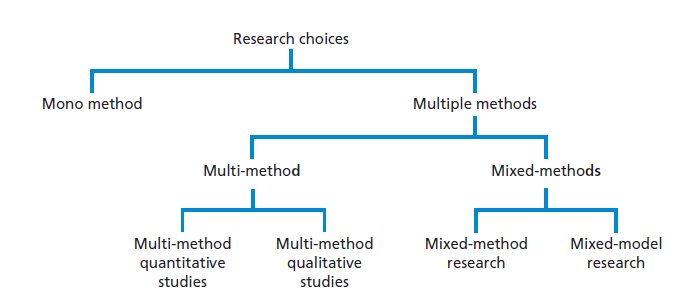
There are mainly two major types of choices: mono method, and multiple methods (Ledford and Gast, 2018). A mono method uses single research method such as either qualitative or quantitative method; whilst multiple method allows the researcher to adopt a combination of both qualitative and quantitative method.
Both of them have their advantages and disadvantages. A quantitative method collects data only on numerical values; thus there is limited scope of participants to provide their opinions on the data collection method (Symon & Cassell, 2012). On the other hand a qualitative method provides the researcher an opportunity to explore the research aspect in details. A hybrid research method has elements of both qualitative and quantitative methods and thus hybrid method can overcomes obstacles of both, at the same time it yield both qualitative and quantitate data. The most important benefit is that it will add both qualitative and quantitative questions for the respondents.
Data Collection techniques
It refers to the technique or means by which data is collected from the participants. Data collection techniques change based on the change of research method. In regards to the primary research; two most commonly used methods are qualitative research and quantitative research.
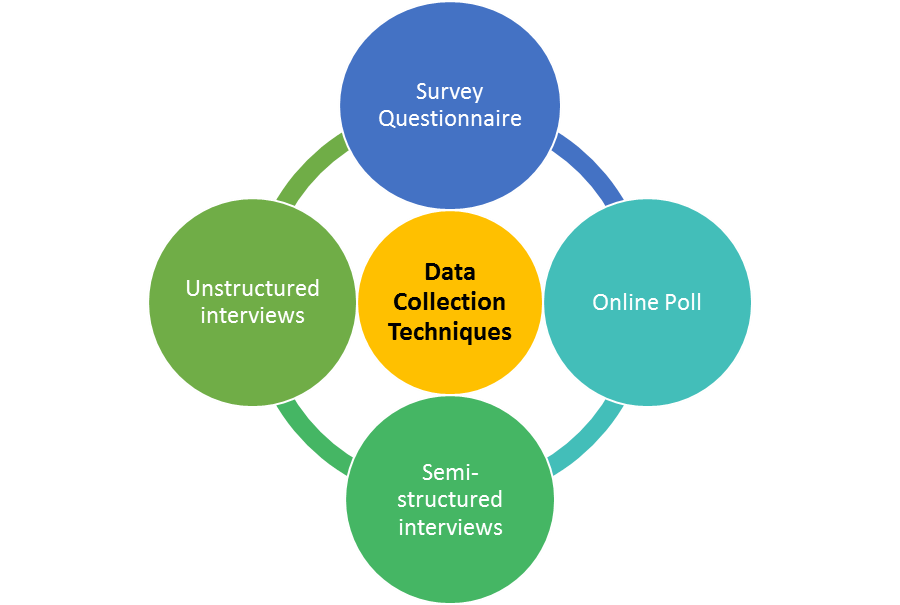
Survey questionnaire is the most commonly used technique for collecting primary and quantitative data (Mackey and Gass, 2015). Advantage to this technique is that it helps the researcher to generate measurable data and the researcher can make numerical conclusions. But drawbacks to survey questionnaire is that it restricts the participants to have only limited view- restricting any opportunity to reveal qualitative opinions.
On the other hand, in qualitative research, semi-structured interviews, unstructured interviews are most commonly means of data collection (Ullah & Ameen, 2018). On the other hand, experimental studies, observation groups etc. are less frequently used data collection technique. A semi-structured interview offers a researcher to direct the interview discussion in certain manner- restricting the respondents from discussing irrelevant issues (Ullah & Ameen, 2018). Drawback to semi-structured interview is that it does not allow the researcher to have rich insights irrespective of the research aspect. On the other hand, unstructured interview is something that does have only a topic, there is no mediating term to control the interview discussion (Ullah & Ameen, 2018). Advantage to unstructured interview is that it allows the interview process to generate rich insights on the research aspect; but drawback is that it deviates the interview process to irrelevant issues.
Data Analysis and Presentation
Data analysis and presentation is an important section in this research because this affects the effectiveness of the retrieved information. This is a qualitative research, therefore the analysis and presentation will also be qualitative. The researcher has used a range techniques to make analytical discussion; such techniques include tables, models, and diagrams. Mainly, the analysis has been aided by descriptive analysis, models and diagrams.
Ethical Considerations
Croucher & Cronn-Mills (2018) have asserted that ethical standards must be followed strictly in any research. This means the research must uphold high ethical values because this is an important requirement of this research. Such ethical values include the research should not be affected by the personal opinions of the researcher, the interview process should be biased free, the participants should not be affected by personal opinions and so on (Croucher & Cronn-Mills, 2018).
References
Anderson, V. (2015). Research Methods in Human Resource Management-Investigating a Business Issue.
Bell, E., Bryman, A., & Harley, B. (2018). Business research methods. Oxford university press.
Crowther, D., & Lancaster, G. (2012). Research methods. Routledge.
Croucher, S. M., & Cronn-Mills, D. (2018). Understanding communication research methods: A theoretical and practical approach. Routledge.
Cohen, L., Manion, L., & Morrison, K. (2017). Research methods in education. routledge.
Chilisa, B., 2019. Indigenous research methodologies. Sage Publications, Incorporated.
Erickson, F. (2012). Qualitative research methods for science education. In Second international handbook of science education (pp. 1451-1469). Springer, Dordrecht.
Flick, U., 2015. Introducing research methodology: A beginner's guide to doing a research project. Sage.
Fisher, C., & Buglear, J. (2010). Researching and writing a dissertation: An essential guide for business students. Pearson Education.
Ghauri, P., Grønhaug, K., & Strange, R. (2020). Research methods in business studies. Cambridge University Press.
Hair Jr, J. F., Page, M., & Brunsveld, N. (2019). Essentials of business research methods. Routledge.
Saunders, M., Lewis, P., & Thornhill, A. (2009). Research methods for business students. Pearson education.
Saunders, M. N., & Lewis, P. (2012). Doing research in business & management: An essential guide to planning your project. Pearson.
Sekaran, U., & Bougie, R. (2016). Research Methods For Business 7th ed. John Wiley.
Zikmund, W. G., Carr, J. C., & Griffin, M. (2013). Business Research Methods (Book Only). Cengage Learning.
